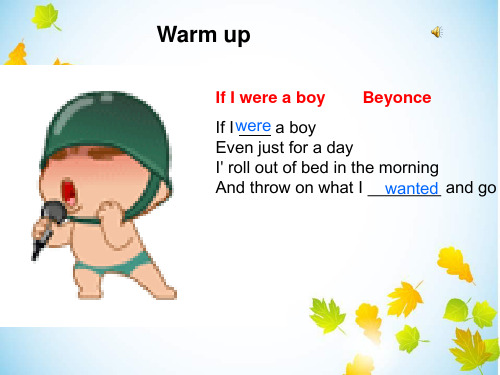新概念英语第一册第71课
- 格式:ppt
- 大小:3.47 MB
- 文档页数:40


新概念英语71课单词新概念英语第71课的单词包括:
1. Prosperous.
2. Unemployment.
3. Inflation.
4. Deflation.
5. Recession.
6. Recovery.
7. Economic.
8. Downturn.
9. Boom.
10. Slump.
"Prosperous" 意为“繁荣的”,"Unemployment" 意为“失业”,"Inflation" 意为“通货膨胀”,"Deflation" 意为“通货紧缩”,"Recession" 意为“经济衰退”,"Recovery" 意为“复苏”,"Economic" 意为“经济的”,"Downturn" 意为“衰退”,"Boom" 意为“繁荣”,"Slump" 意为“暴跌”。
这些单词是与经济和金融相关的,掌握它们可以帮助我们更好地理解和讨论与经济相关的话题。
在学习这些单词时,可以结合实际情境进行练习,例如阅读相关的经济新闻或文章,以加深对这些单词的理解和记忆。
同时,也可以通过与他人讨论经济话题的方式来运用这些单词,从而加深记忆。
希望这些单词对你的学习有所帮助。




Lesson 71 单词讲解1.awful adj. 让人讨厌的,坏的2.telephone v. & n. 打电话;电话call3.time n. 次(数)once /wʌns/ twice /twais/ three times four times …I read this book twice.4.a nswer v. 接(电话)answer the phonest adj. 最后的,前一次的last night / last week / last month / last year6.phone n. 电话7.again adv. 又一次地Very nice to see you again.8.say (said) v. 说say /sei/ said /sed/ says /sez/say VS speaksay 强调说话的内容She said hello to me.He said sorry to me.My mom always says “Life was like a box of chocolate…”speak 突出说话的方式或动作本身speak loudly speak slowly speak EnglishLesson 71 课文讲解What is the climate like?What is the weather like?He telephoned me again.yesterday evening last nightLesson 71 语法讲解He was in the office.Was he in the office?Yes, he was. No, he wasn’t.He wasn’t in the office.Where was he?Who was in the office?There was a car race in our town in 1998. Was there a car race in our town in 1998? There wasn’t a car race in our town in 1998. What was there in our town in 1998?He went to school yesterday. do did /did/ Did wentDo he go he Do to school yesterday? ? e He like s coffee .He went to school yesterday. do notdid He donotgowent to school yesterday.He didn’t go to school yesterday.He went to school y e s t e r d a y. 他什么时候去上学了?did When do hegowent to school?He went to s c h o o l yesterday. 他昨天去哪了?did goWhere do he went yesterday?He w e n t to school yesterday. 他昨天干什么了?did doWhat do he did yesterday?He went to school yesterday. 昨天谁去上学了?Who went to school y esterday?She lived in New York.Did she live in New York? Yes, she did. No, she didn’t. She didn’t live in New York. Where did she live?Who lived in New York?I bought a book in that bookstore last week. bought /b ɔ : t/ buy 的过去式Did you buy a book in that bookstore last week? Yes, I did. No, I didn’t.I didn’t buy a book in that bookstore last week.When did you buy a book in that bookstore?Where did you buy a book last week?Lesson 72 单词句型讲解Today:this morningthis afternoonthis eveningLesson 72 单词句型讲解t onightLesson 72 单词句型讲解Yesterday:yesterday morningyesterday afternoonyesterday eveningLesson 72 单词句型讲解l ast nightThe day before yesterday:the day before yesterday in the morningthe day before yesterday in the afternoonthe day before yesterday in the evening如遇到视频无法正常播放,课件错误,知识点错t 误h 等e 课n 程问ig 题h ,t 可b 以e 添f 加o 服r 务e Ql Qa 3s 17t 0322794进行解决,学习问题请到知识堂: http:/Tomorrow:tomorrow morningtomorrow afternoontomorrow eveningtomorrow nightThe day after tomorrow:the day after tomorrow in the morningthe day after tomorrow in the afternoonthe day after tomorrow in the eveningthe night after next1.She is going to come now. (when)2.She can come now. (when)3.She wants a new bike. (what)4.There is a book on the table. (what)5.They like black coffee. (what)6.Mary comes from Germany. (where)7.He must go home now. (when)8.She feels ill. (how)9.He has a cold. (what)10.She cleaned her shoes. (when) A 一般疑问句B 特殊疑问句C 否定句1.She is going to come now. (when)Is she going to come now?When is she going to come?She isn’t going to come now.2.She can come now. (when)Can she come now?When can she come?She can’t come now.3.She wants a new bike. (what)Does she want a new bike?What does she want?She doesn’t want a new bike.• 4. There is a book on the table. (what)•Is there a book on the table?•What is there on the table?•There isn’t a book on the table.5.They like black coffee. (what) •Do they like black coffee?•What do they like?•They don’t like black coffee.6.Mary comes from Germany. (where) •Does Mary come from Germany?•Where does Mary come from?•Mary doesn’t come from Germany.7.He must go home now. (when) •Must he go home now?•When must he go home?•He needn’t / mustn’t go home now.8.She feels ill. (how) •Does she feel ill?•How does she feel?•She doesn’t feel ill.9.He has a cold. (what)•Does he have a cold?•What does he have?•What is the matter with him?•He doesn’t have a cold.10.She cleaned her shoes. (when) •Did she clean her shoes?•When did she clean her shoes?•She didn’t clean her shoes.。
新概念英语第一册71课课文《新概念英语第一册》第71课的课文是关于"An ideal student"(理想的学生)的。
课文内容如下:An ideal student.An ideal student is a model for others. He is fully conscious of his duties and responsibilities. He paves the way for others. He is regular and punctual. He prepares his lessons well and never neglects his work. He is always neat and clean. He respects his teachers and is helpful and friendly to his classmates. He is obedient and disciplined. He never quarrels or fights with anyone.An ideal student is always polite and gentle. He is good in his studies and always does well in examinations. He is intelligent and hardworking. He takes an active part in co-curricular activities. He is a good speaker anddebater. He is also good in sports and games. He is a well-rounded personality.An ideal student is ambitious and has a clear vision of his future. He sets goals for himself and works hard to achieve them. He is focused and determined. He knows the importance of education and strives for excellence in his academic pursuits. He is self-motivated and never gives up easily.An ideal student is not only concerned about his own growth but also about the welfare of others. He is kind and compassionate. He helps those in need and participates in social service activities. He is aware of the issues and challenges faced by society and actively contributes to its betterment.In conclusion, an ideal student is a role model for others. He possesses qualities like discipline, dedication, intelligence, and compassion. He strives for excellence in all aspects of life and works towards personal growth as well as the betterment of society.以上是《新概念英语第一册》第71课的课文内容。
新概念第一册71课课文在《新概念英语》第一册的第71课中,作者谈到了“一个困难的问题”。
在这篇课文中,作者通过描写孩子们在遇到困难时的表现,以及他们解决问题的方式,来传达了一个重要的教育理念。
故事开始时,作者提到了一群小孩在一所农村小学的课堂上。
当老师提问一个看似简单的问题时,这群孩子们并没有立刻回答。
相反,他们都默默地思考起来。
这是因为这个问题并不像他们平常所面对的题目那样简单明了。
作者进一步表达了他对孩子们思考的赞叹之情,称赞他们的思考方式非常独特。
他们并不像其他学生那样盲目地寻求老师的帮助,而是通过自己的思考和探索来寻找答案。
这种独立的思考方式使得他们能够在学习过程中掌握一些关键的技能和策略。
然而,作者也谈到了孩子们在解决问题过程中遇到的困难。
他们面对的一个挑战是他们难以控制自己的时间,总是过度地思考和考虑。
这使得他们在解决问题时花费了过多的时间,从而无法按时完成任务。
这个问题让作者开始思考如何帮助这些孩子们更好地解决问题。
在接下来的一段中,作者提到了一个解决这个问题的方法。
他鼓励孩子们在解决问题时,要学会分析问题的本质,而不是陷入琐碎的细节中。
这样一来,他们可以更快地抓住问题的要点,并能够迅速找到解决问题的方法。
作者还引用了一个心理学家的观点,指出对问题本质的分析和理解是解决问题的关键所在。
最后,作者总结了这个困难问题的教育价值。
他认为,通过遇到困难问题、思考,并试图解决它们,孩子们不仅能够培养独立思考和解决问题的能力,还能够培养他们的兴趣和动力。
这样一来,他们就能更好地应对日后生活中遇到的挑战。
总的来说,第71课的《一个困难的问题》告诉了我们,教育不仅是为了灌输知识,还应该培养学生的思考能力和解决问题的能力。
通过鼓励学生们独立思考、分析问题本质,我们可以帮助他们在面对困难时更加自如地应对,并培养他们未来生活中所需的技能和策略。
这个课文也向我们传达了一个非常重要的教育理念:教育的目的不仅仅是为了教会孩子们掌握知识,还要培养他们的智力、思考能力和解决问题的能力,以应对未来的挑战。
【导语】新概念英语作为⼀套世界闻名的英语教程,以其全新的教学理念,有趣的课⽂内容和全⾯的技能训练,深受⼴⼤英语学习者的欢迎和喜爱。
为了⽅便同学们的学习,⽆忧考为⼤家整理了⾯的新概念第⼀册课⽂翻译及学习笔记,希望为⼤家的新概念英语学习提供帮助!Lesson67 【课⽂】 MRS.JOHNSON: Hello. Were you at the butcher's? MRS.WILLIAMS:Yes. I was. Were you at butcher's, too? MRS.JOHNSON: No, I wasn't. I was at the greengrocer's. How's Jimmy today? MRS.WILLIAMS:He's very well, thank you. MRS.JOHNSON: Was he absent from school last week? MRS.WILLIAMS:Yes, he was. He was absent on Monday, Tuesday, Wednesday and Thursday. How are you all keeping? MRS.JOHNSON: Very well, thank you. We're going to spend three days in the country. We're going to stay at my mother's for the weekend. MRS.WILLIAMS:Friday, Saturday and Sunday in the country! Aren't you lucky! 【课⽂翻译】 约翰逊夫⼈:您好。
刚才您在⾁店⾥吗? 威廉斯夫⼈:是的,我在⾁店⾥。
您也在⾁店⾥吗? 约翰逊夫⼈:不,我不是。